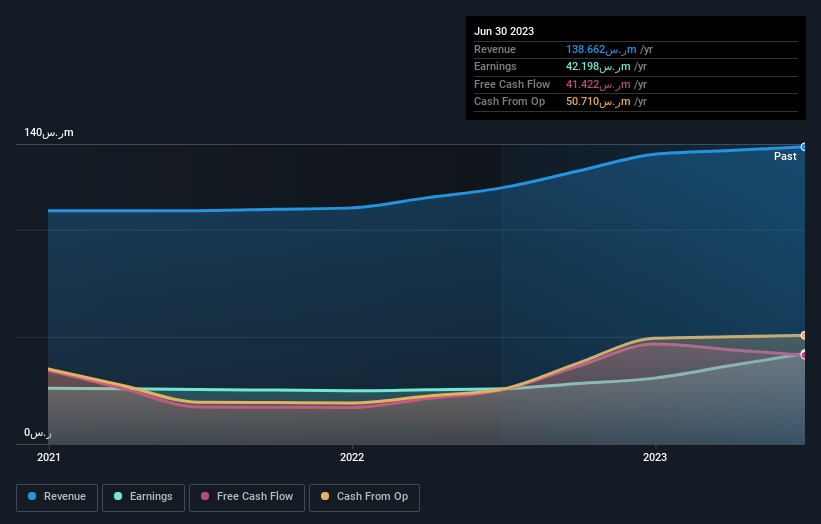Stock Analysis
- Saudi Arabia
- /
- Building
- /
- SASE:9529
Insiders the biggest winners as Raoom trading Company's (TADAWUL:9529) market cap rises to ر.س824m

Key Insights
- Raoom trading's significant insider ownership suggests inherent interests in company's expansion
- 57% of the company is held by a single shareholder (Abdulaziz Bin Al Humaid)
- Ownership research, combined with past performance data can help provide a good understanding of opportunities in a stock
If you want to know who really controls Raoom trading Company (TADAWUL:9529), then you'll have to look at the makeup of its share registry. With 57% stake, individual insiders possess the maximum shares in the company. Put another way, the group faces the maximum upside potential (or downside risk).
As a result, insiders scored the highest last week as the company hit ر.س824m market cap following a 20% gain in the stock.
In the chart below, we zoom in on the different ownership groups of Raoom trading.
View our latest analysis for Raoom trading

What Does The Lack Of Institutional Ownership Tell Us About Raoom trading?
Small companies that are not very actively traded often lack institutional investors, but it's less common to see large companies without them.
There are many reasons why a company might not have any institutions on the share registry. It may be hard for institutions to buy large amounts of shares, if liquidity (the amount of shares traded each day) is low. If the company has not needed to raise capital, institutions might lack the opportunity to build a position. It is also possible that fund managers don't own the stock because they aren't convinced it will perform well. Institutional investors may not find the historic growth of the business impressive, or there might be other factors at play. You can see the past revenue performance of Raoom trading, for yourself, below.

Hedge funds don't have many shares in Raoom trading. The company's largest shareholder is Abdulaziz Bin Al Humaid, with ownership of 57%. This implies that they have majority interest control of the future of the company. Meanwhile, the second largest shareholder is Chief Executive Officer Humaid Bin Al-Humaid and holds 0.4% of the shares outstanding.
Researching institutional ownership is a good way to gauge and filter a stock's expected performance. The same can be achieved by studying analyst sentiments. As far as we can tell there isn't analyst coverage of the company, so it is probably flying under the radar.
Insider Ownership Of Raoom trading
The definition of an insider can differ slightly between different countries, but members of the board of directors always count. Company management run the business, but the CEO will answer to the board, even if he or she is a member of it.
Most consider insider ownership a positive because it can indicate the board is well aligned with other shareholders. However, on some occasions too much power is concentrated within this group.
It seems that insiders own more than half the Raoom trading Company stock. This gives them a lot of power. So they have a ر.س471m stake in this ر.س824m business. Most would argue this is a positive, showing strong alignment with shareholders. You can click here to see if those insiders have been buying or selling.
General Public Ownership
The general public-- including retail investors -- own 43% stake in the company, and hence can't easily be ignored. This size of ownership, while considerable, may not be enough to change company policy if the decision is not in sync with other large shareholders.
Next Steps:
While it is well worth considering the different groups that own a company, there are other factors that are even more important. To that end, you should be aware of the 4 warning signs we've spotted with Raoom trading .
If you would prefer check out another company -- one with potentially superior financials -- then do not miss this free list of interesting companies, backed by strong financial data.
NB: Figures in this article are calculated using data from the last twelve months, which refer to the 12-month period ending on the last date of the month the financial statement is dated. This may not be consistent with full year annual report figures.
Valuation is complex, but we're helping make it simple.
Find out whether Raoom trading is potentially over or undervalued by checking out our comprehensive analysis, which includes fair value estimates, risks and warnings, dividends, insider transactions and financial health.
View the Free AnalysisHave feedback on this article? Concerned about the content? Get in touch with us directly. Alternatively, email editorial-team (at) simplywallst.com.
This article by Simply Wall St is general in nature. We provide commentary based on historical data and analyst forecasts only using an unbiased methodology and our articles are not intended to be financial advice. It does not constitute a recommendation to buy or sell any stock, and does not take account of your objectives, or your financial situation. We aim to bring you long-term focused analysis driven by fundamental data. Note that our analysis may not factor in the latest price-sensitive company announcements or qualitative material. Simply Wall St has no position in any stocks mentioned.
About SASE:9529
Raoom trading
Raoom trading Company manufactures, processes, and trades in glass, mirrors, and aluminum decorations in the Kingdom of Saudi Arabia and Gulf countries.
Flawless balance sheet with solid track record.

